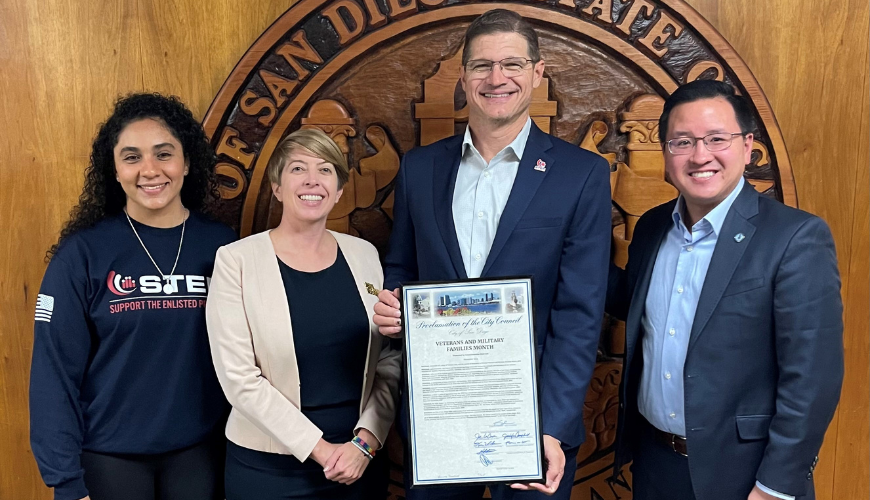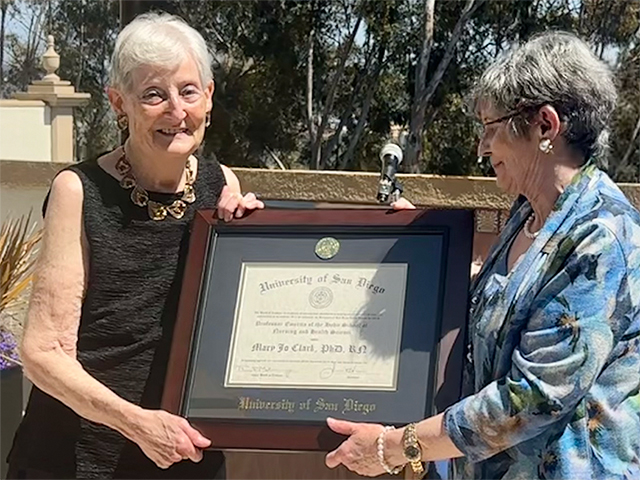U.S. Navy Veteran Finds ‘Home’ in Serving Others

Growing up in a military family meant frequent moves for Tony Teravainen ’12 (MSEL). With his father serving in the U.S. Air Force, his focus was on survival and navigating the ever-changing landscapes of military life, not on long-term goals.
"It wasn't a bad childhood," says Teravainen, "It was just a hard life. All I knew about school was survival. Sit in the back, keep your mouth shut. The teacher will be gone, or you'll be gone before you get into any trouble."
Despite these challenges, one aspiration Teravainen clung to was working at the Newport News Shipyard as an electrician. While many of his peers found themselves in typical adolescent jobs like fast food, Teravainen chose to grow his skills and build a support system as an electrician. Hiscolleagues persuaded him to consider college so he decided to take the leap and apply, where he was accepted to Old Dominion University.
His transition to college life proved overwhelming, with large classrooms and an immense campus. It was a different culture from the large air force bases Teravainen experienced growing up. Feeling out of place, he made a pivotal phone call to his father — one that would set the course of his life on a different trajectory.
Teravainen recalled the conversation: "I said, 'Hi.' My father said, 'Are you going back next semester?' I said, 'Funny you should ask ...'He told me to grab a pencil and write a number down."
Teravainen hung up and dialed the number. He spoke into the phone and simply said, "My dad said to call you." The unknown voice on the other end belonged to a Navy recruiter. Before he knew it, Teravainen found himself in a Navy recruiting office.
"It was interesting because I didn't really know anything about Navy uniforms or rank, despite growing up on these bases. I did feel a sense of peace being back in a military environment, even though it was one I was unfamiliar with," Teravainen recalls.
Flipping through the Navy's catalog, he noticed an opportunity to become an electrician, which he thought would give him an edge. Little did he know, he also qualified for the nuclear power program. When the recruiter explained the benefits, it was a no-brainer for Teravainen.
"I looked at the recruiter and said, 'Let me get this straight ... I could be on a submarine, you'll teach me to run a nuclear reactor, you’re going to pay me for this, and you’re giving me a place to sleep before Christmas before I become homeless because I'm getting kicked out of the dorms?'" The recruiter's response? A resounding "Yeah."
On Christmas Eve, Teravainen boarded a train to boot camp, embarking on a journey that would shape his life in ways he could never have imagined.
The nuclear power program was tough. Teravainen describes the program being made up of "a bunch of engineering school dropouts," which in a way, made him feel like he found his purpose, and his people. Teravainen was determined to succeed in the nuclear power program, as he feared ending up as a regular electrician sent out to the fleet to clean motors for the rest of his life.
"What I quickly found is that I was always picked to do more, lead others, help others, tutor others," Teravainen reflects. "When I finally got to my submarine, I wasn't given any of the crap jobs like peeling potatoes. For some reason, I stood apart."
Despite his success, Tony started to get sick, and an undiagnosed, acute pancreatic issue turned into a chronic problem. After completing three tours, Teravainen was qualified to work as a nuclear project manager supporting two squadrons of submarines in San Diego, a role he would gladly take given the uncertainty of his health and time left in the Navy. But his health issues eventually caught up with him, and he was told he couldn't continue.
It was a devastating blow.
Teravainen managed to cut a deal to work for an additional year and a half, staying ashore and avoiding reactor testing. However, the abrupt end to his naval career left him at a crossroads. "I said, 'Where am I going to go?' He [the man with the discharge papers] told me, 'I don't care where you go, just don't come here.'"
Undeterred, Tony found an opportunity at Sony Electronics, leveraging the skills he had honed in the Navy. He worked his way up to Chief Maintenance Engineer, with promotions facilitated by his returning to school. He earned bachelors’ degrees in business management and nuclear engineering while working at Sony, which enabled his continued advancement.
Over a decade later, Teravainen transitioned to a consulting role at Booz Allen Hamilton, but imposter syndrome began to creep in. In a room with over a hundred other consultants, the contrast between their prestigious educational backgrounds and Tony's distance learning degrees became apparent. Despite the dissonance Teravainen felt, his colleagues continued to seek his guidance, recognizing the value he brought to the team.
Realizing that he needed to level up his skills, Tony decided to pursue a master's in executive leadership, which led him to the University of San Diego (USD). There, he volunteered with Operation Homefront, a nonprofit committed to helping military families. After graduating in 2012 with a Master’s in Executive Leadership, Teravainen took a bold step, leaving his secure career as a consultant at Booz Allen Hamilton to start a nonprofit — Support The Enlisted Project (STEP).
Founded in 2012, STEP's mission is to train young military families in financial self-sufficiency through a comprehensive financial behavioral program. Unlike some nonprofits that provide temporary assistance, STEP's focus is on creating lasting change. Over the past decade, STEP has assisted thousands of families across numerous states, helping them improve their financial wellness, with a 90% success rate of helping them become financially self-sufficient.
“We treat people like they are more than sheep. That’s one of my biggest problems with some nonprofits. Are we just trying to help people get by, or are we doing something more permanent? I didn’t want a program where you just get the toys or pass out the Easter basket.”
Teravainen's journey from submarines to social impact shows the power of resilience, determination and a commitment to giving back to the community. Today, while still leading STEP, he continues his educational journey at Liberty University where he is completing his dissertation for a PhD in Public Policy. This educational emphasis has also led to him serving as an adjunct professor at USD’s Knauss School of Business, developing the next generation of operations managers and social impact leaders.
For Teravainen, the journey has come full circle, and after years of moving and transitioning from one phase to the next, he's finally found his home in service to others.
— Kelsey Grey ’15 (BA)
Contact:
USD News Center
news@sandiego.edu
(619) 260-4681



